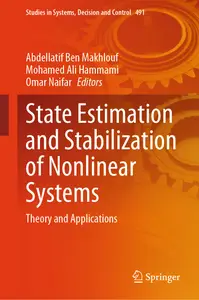- Témaindító
- #1
- Csatlakozás
- 2024.09.10.
- Üzenetek
- 25,854
- Reakció pontszám
- 8
- Díjak
- 5
- Kor
- 37

Free Download State Estimation and Stabilization of Nonlinear Systems: Theory and Applications (Studies in Systems, Decision and Control, 491) by Abdellatif Ben Makhlouf, Mohamed Ali Hammami, Omar Naifar
English | November 7, 2023 | ISBN: 3031379691 | 452 pages | MOBI | 71 Mb
This book presents the separation principle which is also known as the principle of separation of estimation and control and states that, under certain assumptions, the problem of designing an optimal feedback controller for a stochastic system can be solved by designing an optimal observer for the system's state, which feeds into an optimal deterministic controller for the system. Thus, the problem may be divided into two halves, which simplifies its design. In the context of deterministic linear systems, the first instance of this principle is that if a stable observer and stable state feedback are built for a linear time-invariant system (LTI system hereafter), then the combined observer and feedback are stable. The separation principle does not true for nonlinear systems in general. Another instance of the separation principle occurs in the context of linear stochastic systems, namely that an optimum state feedback controller intended to minimize a quadratic cost is optimal forthe stochastic control problem with output measurements. The ideal solution consists of a Kalman filter and a linear-quadratic regulator when both process and observation noise are Gaussian. The term for this is linear-quadratic-Gaussian control. More generally, given acceptable conditions and when the noise is a martingale (with potential leaps), a separation principle, also known as the separation principle in stochastic control, applies when the noise is a martingale (with possible jumps).
Buy Premium From My Links To Get Resumable Support,Max Speed & Support Me
Code:
⚠
A kód megtekintéséhez jelentkezz be.
Please log in to view the code.
